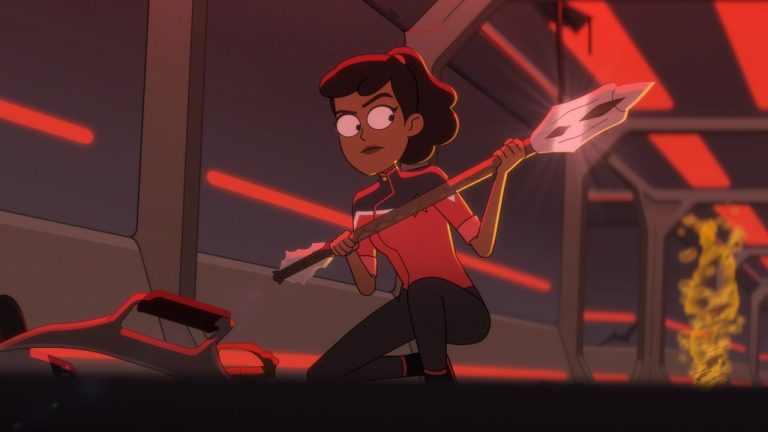Star Trek: Lower Decks Episode 10 Review: No Small Parts
The season finale of Lower Decks is perhaps the best season finale of Star Trek series since...well, “The Best of Both Worlds.” Maybe?

This Star Trek: Lower Decks review contains spoilers.
Star Trek: Lower Decks Episode 10
Since it debuted, Star Trek: Lower Decks has made no bones about being a quirky sequel to The Next Generation. Yes, there are Easter eggs from Deep Space Nine to Enterprise, but the tone and spirit of the show is firmly TNG. And, in the finale episode of its first season, Lower Decks brings back a tradition that TNG arguably perfected: The season finale that makes you love the show ten times more than you already did.
The season finale of Lower Decks — “No Small Parts” — is not the best episode of the season. But then again, because this episode is the entire season in one hilarious jolt, it could easily serve as a quick way to get someone into the show who was holding out. Basically, “No Small Parts” feels like a real Trek season finale — not the season finale to comedy series. This legit TNG zing is so powerful that the only negative thing you can say about this episode is that it’s going to be tough to top.
Good Star Trek season finales are in a different category from all other Trek episodes. If you don’t count the original series (which you really shouldn’t because those season finales aren’t really what season finales became) you could argue that TNG actually has, on average, the worst season finales of all the other Trek series. Think about it. “The Best of Both Worlds” is fantastic, but after that? What’s the next great TNG finale? I mean, they really tried with “Redemption,” where Worf leaves the Enterprise and ditto for “Descent” wen Data seems to turn evil, but if you’re honest with yourself, then you know that maybe the second-best TNG season finale is “Times Arrow,” and even that is a distant second to “The Best of Both Worlds.”
Meanwhile, Voyager, DS9, and yes, even Enterprise have tons of season finales that are all better than TNG season finales that are not “The Best of Both Worlds.” For example, Voyager’s “Equinox” is better than “Time’s Arrow,” and “Shockwave,” from Enterprise is better than “Descent.” And in terms of moving the story forward in a way that felt big and important, nearly every DS9 finale has more weight than TNG finales, because on that show, you knew the big changes were gonna stick. Even though we all bit our nails during the summer 1990, wondering if Picard would come back from being a Borg, the good money was on the idea that he would return. Even TNG’s best finale lacks the teeth of its successors.
And yet. TNG perfected the Star Trek season finale, which paved the way for the other shows to do it, too. The Lower Decks season 1 finale knows this, and showrunner Mike McMahan has crafted a finale that isn’t perfect, but it’s seemingly imperfect on purpose. If every episode of Lower Decks is an episodic think piece on other episodes of Star Trek, then “No Small Parts” is a statement about how big episodes of Trek can change the franchise and keep it familiar simultaneously. By the time this episode is over, Boimler has transferred to the USS Titan, Rutherford’s memory has been erased, and Jax is dead. These things are not getting undone for season 2. The changes are here to stay, kind of like when Tasha Yar died in “Skin of Evil” in TNG’s first season. That episode wasn’t a season finale, but Lower Decks knows the actual season finale TNG season 1 (“The Neutral Zone”) sucked, so, they tried to make better one.
If the entire season has been trying to figure out what will happen to Mariner and Boimler, then Lower Decks follows-thru on these character arcs, possibly better than any other first season of a Trek show. Part of this is a little bit of a cheat. Mariner and Boimler haven’t actually had to deal with as many horrific things as other Trek characters, but, in terms of personal growth and interesting changes, “No Small Parts” does something comedies rarely are able to do — surprise us. Generally speaking, you want your situation comedy to keep the situation relatively the same. But, the Lower Decks finale doesn’t care about all that. By the end of it, Boimler is gone, and Mariner is actually cool with working with her mom — Captain Freeman — without being a jerk about it. The banter between Mariner and Boimler and her friction with her mom kind of defined the entire first season. So, by having Boimler leave the USS Cerritos and to have Mariner be buddies with her mom, the series gestures at some maturity and confidence other Trek shows couldn’t have done as quickly.
Granted, Lower Decks growing up fast is also a little bit of a magic trick. This is still a comedy, which means, the stakes, will still remain slightly lower than other shows in the Trek-verse. And yet, Jax really did die saving Rutherford. And Boimler really did ditch his best friend for a career opportunity. These things weren’t played for laughs, they just happened.
It’s been said many times that the strength of Star Trek is that it really doesn’t have one genre. Sure, science fiction informs the setting of Trek, but the genre changes from episode-to-episode and series-to-series. Discovery is mostly an action-adventure show. TNG and Picard are more drama. Enterprise feels like a borderline Western, as did TOS. But within those series, you can jump to slapstick comedy episodes, whodunnits, and, bizarrely, at least a couple gothic romances. In its first season, Lower Decks hasn’t really outdone any one specific episode of great Treks from other shows, but the charm of the series, and of this finale in specific, is that it’s made you think the show has been on for slightly longer than it has.
When Riker, Troi, and the USS Titan warp to the rescue in the last act of the episode, and Will Riker blurts out “Mariner!” you really feel like Lower Decks is officially part of the family. Or, more accurately, that it always was.
